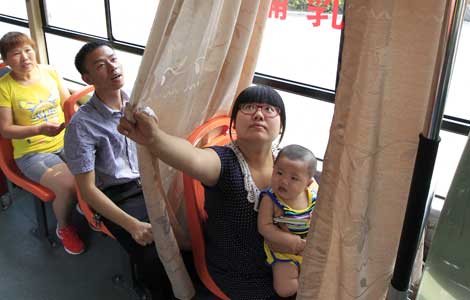Family policy deserves a rethink
Updated: 2013-08-15 08:07
By Mu Guangzong (China Daily)
|
||||||||
Contrary to what some people claim, this will not lead to a population boom, because the high cost of bringing up a child will dissuade a majority of such couples from having a second child. Besides, people's changed priorities because of the economic and social development of the past three decades will prevent many from having a second child. In particular, not many working women in urban areas would agree to undergo the trials and tribulations of labor twice all over. So even if the family planning policy is changed to allow more couples to have two children, not many families will avail of it.
In other words, although a change in the family planning policy may slightly increase the country's birth rate, it will not lead to a population boom. Instead, it could be an answer to China's current imbalanced population structure, aging population and waning demographic dividends.
Official data show that China had about 194 million people aged 60 years and above by 2012, which was 14.3 percent of the total population. Last year was also the first time when the percentage of working age population (aged 15-59) dropped, and going by statistical projections, China will lose its demographic dividends before 2030.
The country's population structure is like an inverted pyramid, with rising number of senior citizens at the top and shrinking number of youths at the bottom. As a result, senior citizens get to enjoy less and less social and family provisions, with parents who lost their only offspring when they were too old to have another suffering the most.
Allowing couples one of whom has no siblings to have a second child could ease, if not altogether solve, many of the above problems. Given the social and economic realities of the times, changing the family planning policy will help improve the family structure, increase provisions for the aged and promote harmony in society.
Moreover, "loosening" the family policy will curb the gender imbalance in China. Even though figures for the past three years suggest the gender ratio at birth has improved, the ratio is still 10 percentage points above the warning mark with newborn boys outnumbering girls by 10 percent.
Census data show that the gender ratio problem is still grave among adolescents and teenagers, and it is estimated that by 2020, China will have 24 million more men than women of marriageable age.
By allowing more families to have a second child, the authorities will help curb the gender imbalance, because then fewer couple will go in for illegal prenatal sex discernment tests of fetuses and female feticide.
To build a balanced population structure, the authorities have to take measures to gradually allow more couples to have a second child on a trial basis, and eventually move toward a two-child policy. And to establish an ideal population policy, the government has to fulfill some additional responsibilities of providing support for couples and improving welfare services.
The author is a professor of demography at Peking University.
(China Daily 08/15/2013 page9)

 Two killed in fiery crash of UPS cargo jet
Two killed in fiery crash of UPS cargo jet
 Special bus seat for breast-feeding mothers
Special bus seat for breast-feeding mothers
 Northern exposure
Northern exposure
 Re-enacting ancestors' journey to the west
Re-enacting ancestors' journey to the west
 Yao dreams of sports for fun with towering charity
Yao dreams of sports for fun with towering charity
 Protests arise in Taiwan over 'comfort women'
Protests arise in Taiwan over 'comfort women'
 Huawei unveil Ascend P6 smartphone in Vienna
Huawei unveil Ascend P6 smartphone in Vienna
 When small is beautiful in hotel industry
When small is beautiful in hotel industry
Most Viewed
Editor's Picks

|

|

|

|

|

|
Today's Top News
Over 200 dead after Egypt forces crush protesters
2 killed in crash of UPS cargo jet
China to probe foreign automakers
Watchdog to protect rights of consumers
Sizzling summer tops the record list
Egypt declares monthlong state of emergency
Typhoon makes landfall in S China
UN seek private firms' help in curbing HIV/AIDS
US Weekly

|

|




